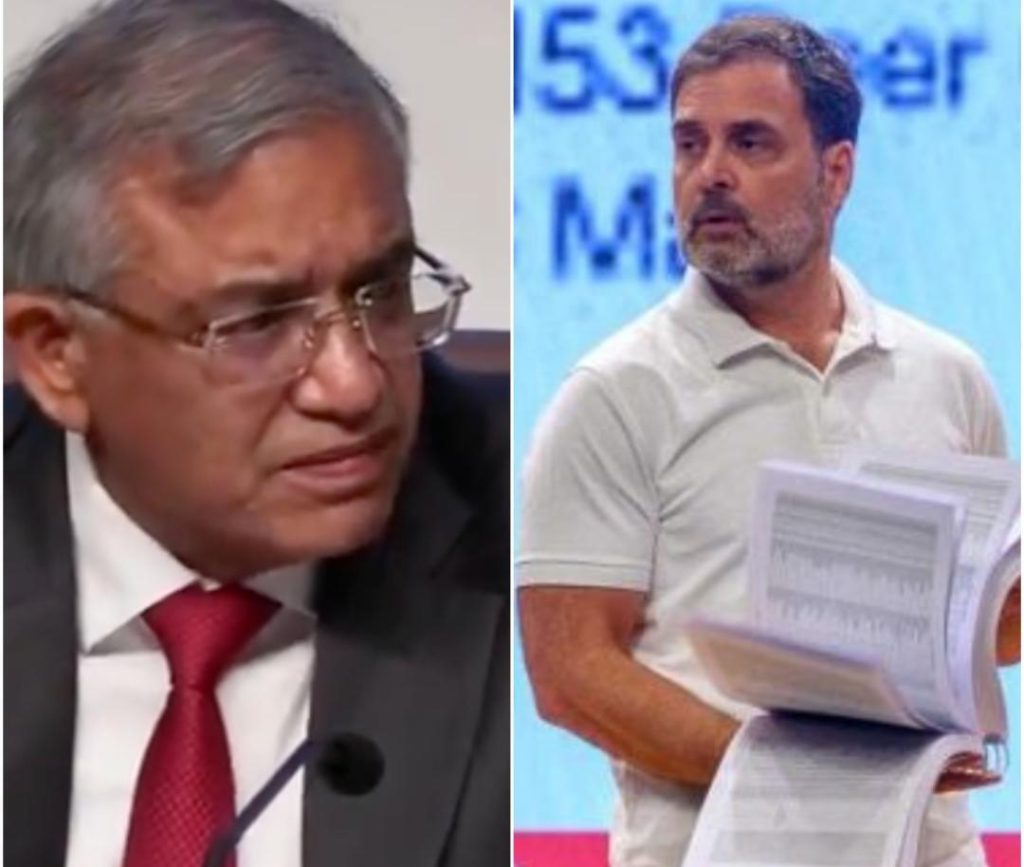
Vote Chori’ Phrase an Insult; Should We Share CCTV Footage of Mothers & Sisters Voting?: EC
The ongoing political turmoil in India has led to a plethora of controversies, with the latest being the “vote chori” phrase used by Congress leader Rahul Gandhi to claim that elections are rigged. The Chief Election Commissioner (CEC), Gyanesh Kumar, has slammed this phrase, calling it an insult to the Constitution. Furthermore, in response to demands for releasing surveillance footage from polling booths, the EC has raised concerns over voter privacy.
The “vote chori” phrase, which translates to “voting thieves,” implies that the electoral process is marred by widespread rigging and manipulation. However, the EC has taken umbrage with this term, stating that it undermines the integrity of the democratic system. In a recent statement, CEC Gyanesh Kumar emphasized that such phrases are not only misleading but also disrespectful to the Constitution, which ensures the right to free and fair elections.
The EC’s criticism of the “vote chori” phrase is not without merit. The term not only fuels misinformation but also creates a sense of mistrust among voters. When politicians level such allegations, they often fail to provide concrete evidence to back their claims, leading to further confusion and chaos. Moreover, such rhetoric can also have a detrimental impact on the electoral process, discouraging people from participating in the democratic process.
Another contentious issue that has been raised in the wake of the “vote chori” phrase is the demand for releasing CCTV footage from polling booths. Many individuals and political parties have called for the EC to make these recordings public, citing a need for transparency and accountability. However, the EC has refused to oblige, citing concerns over voter privacy.
In a recent statement, the EC asked, “Should the Election Commission share the CCTV videos of any voter, including their mothers, daughters-in-law?” This question highlights the importance of protecting the privacy of individual voters. With CCTV cameras installed in most polling booths, the EC is responsible for ensuring that these recordings are not misused to compromise the privacy of voters.
The EC’s concerns are well-founded. If CCTV footage is made public, it could lead to the identification of individual voters, potentially putting them at risk of harassment, intimidation, or even violence. Furthermore, the release of such footage could also compromise the integrity of the electoral process, as voters may be coerced into voting a certain way or face repercussions for exercising their right to vote freely.
In addition to these concerns, the EC has also emphasized the need to maintain the sanctity of the polling booth. The secrecy of the voting process is essential to ensuring the integrity of the electoral system. If voters feel that their privacy is being compromised, they may be less likely to participate in the democratic process, leading to a decline in civic engagement and a weakening of democracy.
The “vote chori” phrase and the demand for releasing CCTV footage from polling booths are two sides of the same coin. Both issues are intertwined, with the former fueling misinformation and mistrust, and the latter compromising the privacy and security of voters. As the EC has rightly pointed out, it is essential to maintain a balance between transparency and privacy.
In conclusion, the “vote chori” phrase is an insult to the Constitution and undermines the integrity of the democratic system. The EC’s criticism of this term is well-founded, and politicians would do well to refrain from using such language. Furthermore, the demand for releasing CCTV footage from polling booths raises serious concerns over voter privacy and the sanctity of the polling booth. The EC’s decision to prioritize voter privacy is a necessary step to ensure the integrity of the electoral process and the safety of individual voters.






